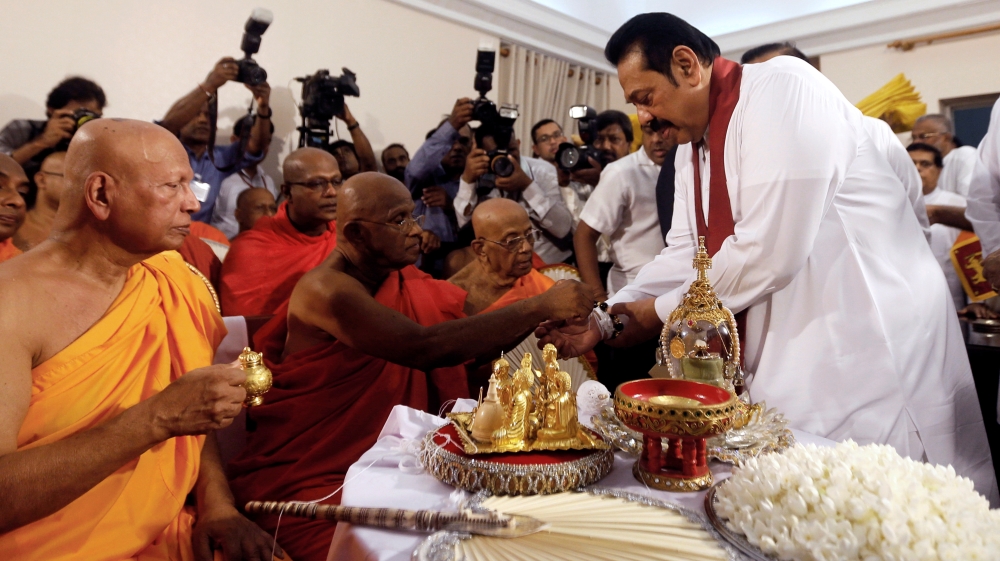Sri Lanka: Warnings of ‘bloodbath’ as political tensions rise
Colombo, Sri Lanka – The speaker of Sri Lanka‘s parliament has warned the country’s political crisis could devolve into a “bloodbath” unless President Maithripala Sirisena reconvened parliament to let lawmakers resolve a power struggle with his sacked prime minister.
The warning on Monday came as legislators loyal to ousted Prime Minister Ranil Wickremesinghe called on their supporters to converge on Sri Lanka’s capital, Colombo, to protest against what they said was a coup by Sirisena.
Speaker Karu Jayasuriya urged the president to let Wickremesinghe prove his majority support on the parliament floor. “If we take it out to the streets, there will be a huge bloodbath,” he told reporters.
Referring to the death of one man when the bodyguard of a deposed minister opened fire at a crowd at the state-run Ceylon Petroleum Corporation (CPC) on Sunday, Jayasuriya added: “There is unrest and foreign countries are issuing travel warnings.
“This will set the country back on the international stage and damage our economy.”
Police have taken the dismissed minister, Arjuna Ranatunga, into custody after workers at the CPC threatened to strike, demanding his arrest over their colleague’s killing.
 |
| Ranil Wickremesinghe (C) insists he remains the prime minister [Lakruwan Wanniarachchi/ AFP] |
Sri Lanka, a Buddhist-majority nation in the Indian Ocean, was plunged into chaos on Friday when Sirisena sacked Wickremesinghe in a surprise move. He also suspended parliament in an apparent bid to shore up support for newly appointed Prime Minister Mahinda Rajapaksa, a former president accused of human rights abuses and corruption.
The shock and confusion triggered by the president’s moves over the weekend dissipated by Monday, and Sirisena was under increasing political and diplomatic pressure to reconvene parliament and resolve the constitutional crisis.
Global pressure
Amidst the call for protests, some 126 legislators in the 225-member House sent letters to Jayasuriya on Monday, urging him to summon parliament, according to Patali Champika Ranawaka, a member of Wickremesinghe’s United National Party (UNP).
That figure includes 104 members of the UNP, and 22 members from the minority parties, Tamil National Alliance and the People’s Liberation Front, he said.
“This is a constitutional coup and spells the death knell for democracy,” Ranawaka told reporters. “I challenge Mahinda Rajapaksa to turn up at the parliament and show his majority.”
The legislator said their supporters will gather in downtown Colombo at mid day on Tuesday to protest Wickremesinghe’s ouster.
Sirisena’s supporters, however, said the speaker does not have the authority to recall the parliament.
|
WATCH: One killed in Sri Lanka shooting as crisis turns violent (2:19) |
Dayasiri Jayasekara, a member of Sirisena’s party, also accused Wickremesinghe of stirring unrest.
“The UNP leader created this tense situation because he is greedy for power. If he feels the constitution has been violated, he should go to the Supreme Court,” he said.
Sirisena said on Sunday that he had no choice but to invite Rajapaksa – a former rival he had defeated in elections in 2015 – to form a new government. That’s because of the alleged involvement of a member of Wickremesinghe’s cabinet in an assassination plot against him, he said.
Meanwhile, Rajapaksa assumed on Monday duties of the prime minister’s office at a ceremony attended by Buddhist monks in Colombo.
He has yet to announce a cabinet.
In a statement on Sunday, the former president, who ruled Sri Lanka from 2005 to 2015, pledged to “eschew politics of hate” and call snap election as soon as possible.
His return to power, however, has worried human rights groups, who hold him responsible for alleged crimes committed by the military at the close of the country’s 26-year-long civil war against Tamil separatists. The conflict ended in 2009.
 |
| Mahinda Rajapaksa (R) assumed duties of the prime minister’s office [Dinuka Liyanawatte/ Reuters] |
Alan Keenan, analyst at the International Crisis Group, said Sirisena’s actions were “illegal” and urged the international community to ramp up pressure on the president.
“Sri Lanka’s democracy is at stake,” he said.
“Rajapaksa appears to be in a strong position.He has the backing of the president, and the sympathy of the police and army. The longer he controls the state, the more likely it is for him to win the vote when parliament convenes,” Keenan told Al Jazeera.
“The international community must tell Sirisena to allow a free and open vote immediately. They must also let him and his supporters know that there will be a price to pay if this farce continues and Rajapaksa ends up staying in power.”
The crisis has sparked widespread international concern.
China called for dialogue on Monday, with Lu Kang, spokesman for the country’s foreign ministry, saying that Beijing was paying close attention to developments in Colombo.
The US, in a statement late on Sunday, expressed concern and backed Wickremesinghe’s call to reconvene parliament.
Antonio Guterres, the UN chief, said he was following developments closely, and called on the government to “respect democratic values” and “uphold the rule of law”. Earlier on Sunday, neighbouring India said it hoped Sri Lanka will follow the constitutional process.
A group of prominent Sri Lankan students issued a statement calling on Sirisena to resume parliament. They said the president’s sacking of Wickremesinghe was the first “unconstitutional and illegal transfer of power” in the country since 1931.
The Church of Ceylon, meanwhile, appealed to the security forces to act “impartially and with restraint” and said the country’s democratic constitution must not be abused for “political expediency”.
Rathindra Kuruwita reported from Colombo. Zaheena Rasheed reported and wrote from Doha.




